|
|
|

|
 |
 |
 |
 |
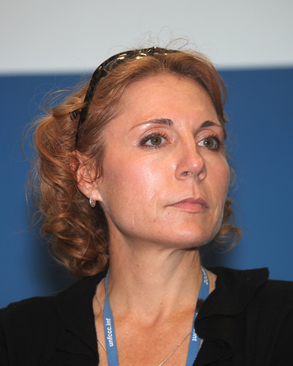 |
| Koko Warner, UNU-EHS, noted four additional case studies on communities’ response to loss and damage, carried out by the African Climate Policy Centre. |
|
 |
 |
 |
 |
|
|
This side-event, moderated by Atiq Rahman, Executive Director, BCAS, aimed to engage participants in discussions on initial findings from four case studies on loss and damage in Bangladesh, Bhutan, the Federated States of Micronesia and the Gambia.
Koko Warner, UNU Institute for Environment and Human Security (EHS), spoke on the CDKN Loss and Damage in Vulnerable Countries Initiative. She stressed that although adaptation is occurring in many communities, adaptation measures are becoming more costly leading to loss and damage that will have longer term, far reaching consequences to local communities.
Golan Rabani, BCAS, presented the Bangladesh case study, which focused on the effects of salinity intrusion and Cyclone Aila. He underscored that in a three year period, four villages in the Shyamnagar region of Bangladesh lost US$1.9 million in rice production due to salinity intrusion, and highlighted that drinking water is also under threat in many villages.
Norbu Wangdi, Ugyen Wangchuck Institute for Conservation and the Environment, Bhutan, presented on the cost of adaptation in Punakha district associated with changing monsoon patterns. He noted community adaptation measures including: increased irrigation channel maintenance; enhanced water-sharing mechanisms; and the performance of rituals. He also mentioned non-monetary losses such as an increase in conflicts over water at household and community levels.
Presenting on loss and damage due to drought in the Gambia, Sidat Yaffa, University of the Gambia, highlighted agricultural communities’ coping mechanisms to regain food security, including: relying on alternative income sources, particularly remittances; selling personal property; relying on foreign food aid from the World Food Programme and the Red Cross; seeking out temporary employment in cities; and relying on networks within the community to help buy food.
Simpson Abraham, Pacific Adaptation to Climate Change, Federated States of Micronesia, presented a case study on the loss and damage associated with coastal erosion and storm surges in the Kosrae region, highlighting the adaptation measures currently being carried out include building a seawall, creating landfills to fortify the coast and building elevated houses.
Sven Harmeling, Germanwatch, presented policy approaches, underscoring the need to: scale up mitigation, adaptation and resilience-building measures; address non-economic losses; address the “hard limits” of adaptation such as compensation and rehabilitation measures; and identify roles for the Adaptation Committee and the Green Climate Fund in dealing with loss and damage.
Ali Tauqeer Sheikh, CDKN, stressed the importance of these initial case studies to humanize technical submissions on loss and damage, noting the challenge of transforming local-level inputs into national level policy.
During discussions, participants considered: lessons learned on resilience from local communities; ways to work with the relevant stakeholders at the national level; biodiversity in relation to loss and damage; particular impacts of loss and damage to girls and young women; approaches to attribution of loss and damage; and the importance of incorporating humanitarian services into the discussion, without depoliticizing the problem.
|
 |
 |
 |
 |
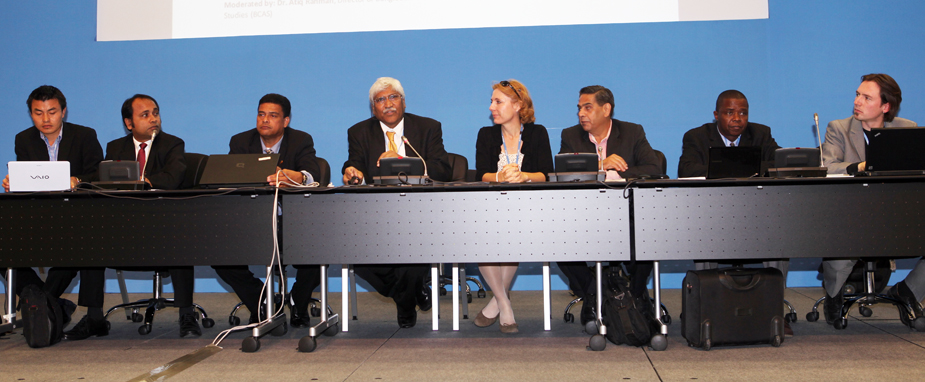 |
Panel (L-R): Norbu Wangdi, Ugyen Wangchuck Institute for Conservation and the Environment, Bhutan; Golan Rabani, BCAS; Simpson Abraham, Pacific Adaptation to Climate Change, Federated States of Micronesia; Atiq Rahman, Executive Director, BCAS; Koko Warner, UNU-EHS; Ali Tauqeer Sheikh, CDKN; Sidat Yaffa, University of the Gambia; and Sven Harmeling, Germanwatch.
|
|
 |
 |
 |
 |
A panel on Viet Nam’s policy responses to climate change and preparations for nationally appropriate mitigation actions (NAMAs) was moderated by Tran Thi Minh Ha, Director General, Ministry of Natural Resources and Environment (MONRE), Viet Nam, and Ryutaro Yatsu, Vice Minister for Global Environmental Affairs, Ministry of the Environment, Japan (MOEJ).
In opening speeches, Ha called attention to support from Japan, among others, for pilot projects to respond to climate change, and Masahiko Horie, Ambassador for Global Environmental Affairs, Ministry of Foreign Affairs (MOFA), Japan, outlined the East Asia Low-Carbon Growth Partnership, noting that it has been endorsed by the East Asia Summit (EAS).
Nguyen Khac Hieu, MONRE, Viet Nam, introduced several climate change policies and strategies developed by Viet Nam, including the: National Target Programme; National Climate Change Strategy; National Green Growth Strategy; and National Action Plan to Respond to Climate Change.
Le Van Minh, MONRE, outlined the Support Program to Respond to Climate Change, and showed a brief video on the programme. Listing the three pillars of its activities as mitigation, adaptation and cross-cutting issues, he highlighted the multiple government agencies and funders involved in these efforts.
Describing the need for gathering baseline data when developing emissions reduction projects that are measurable, reportable and verifiable (MRV), Huynh Thi Lan Huong, Viet Nam Institute of Meteorology, Hydrology and Environment (IMHEN), MONRE, and Makoto Kato, OECC, jointly presented on the development of NAMAs in an “MRVable manner” in the waste sector.
Hoang Van Tam, Ministry of Industry and Trade (MOIT), Viet Nam, presented on preparations for NAMAs in the energy and transport sectors, noting efforts to create a monitoring and reporting system that can be developed into an MRV.
Kenji Shiraishi, GEC, presented on the Joint Crediting Mechanism (JCM) and Bilateral Offset Credit Mechanism, MRV and technology transfer. For the JCM, he noted its aims were to: promote low-carbon technology transfer to developing countries; contribute to achieving NAMAs by developing concrete projects for emissions reductions with simple MRVs; and be an effective way for Japan to realize its carbon emissions targets.
In the ensuing discussion questions addressed, among other things, comparing Viet Nam’s experiences with other countries on NAMAs and MRV and how JCM differed from the Clean Development Mechanism.
In closing remarks, Ha pointed to Viet Nam’s efforts in addressing climate change as models of South-South and South-North cooperation, and Yatsu hoped that cooperation between Viet Nam and Japan would contribute to greenhouse gas (GHG) reductions not only in Viet Nam but also globally.
|
 |
 |
 |
 |
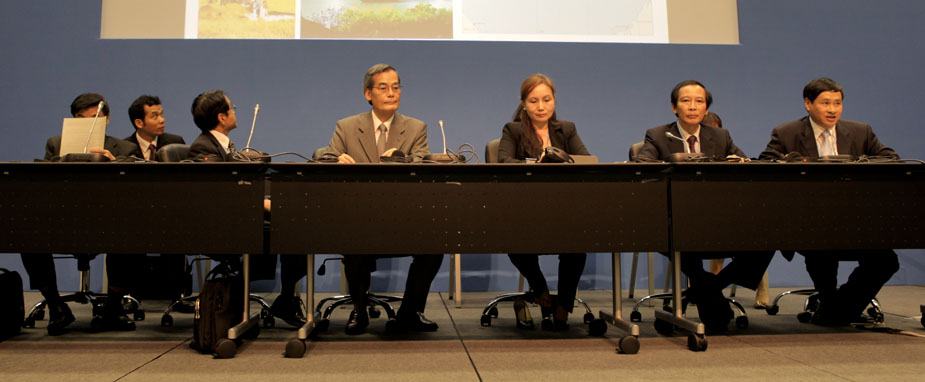 |
Panel (L-R): Le Van Minh, MONRE, Viet Nam; Ryutaro Yatsu, Vice Minister for Global Environmental Affairs, MOEJ; Masahiko Horie, Ambassador for Global Environmental Affairs, MOFA, Japan; Tran Thi Minh Ha, Director General, MONRE, Viet Nam; Tran Thuc, Director General, IMHEN, MONRE, Viet Nam; Nguyen Khac Hieu, MONRE, Viet Nam.
|
|
 |
 |
 |
 |
This side event, moderated by CGE Chair Ruleta Camacho, Environment Division, Antigua and Barbuda, provided an overview of the CGE mandate and activities under the CGE Work Programme.
Camacho noted that the CGE provides technical assistance to non-Annex I parties and recommendations for revision of the guidelines for the non-Annex I parties’ national communications. Patience Damptey, Environmental and Gender Consultant, Ghana, highlighted a survey of non-Annex I parties to identify the concerns, difficulties and capacity gaps in undertaking second national communications. She described regional hands-on training workshops on GHG inventories, mitigation, and vulnerability and adaptation assessments.
Sangchan Limjirakan, CGE member, Thailand, described the results of a survey on the sustainability of the national communications process (FCCC/SBI/2011/5/Add.2), including findings that updating GHG inventories proved challenging for non-Annex I countries.
Fernando Farías, Ministry of Environment, Chile, highlighted cooperation between the CGE and various outside organizations, including through the Global Environment Facility-funded National Communication Support Programme undertaken by the UN Environment Programme and the UN Development Programme. He also noted cooperation with the Intergovernmental Panel on Climate Change.
Kate Larsen, State Department, US, outlined lessons learned, including that: technical support requires continuity; regional workshops inform the CGE of regional needs; hands-on training workshops should focus on implementation of adaptation options; training materials should include regional content; and training material must reflect changes to reporting procedures under the UNFCCC.
CGE Chair Camacho outlined recommendations including: making updated training materials publicly available; encouraging workshop participants to share and disseminate materials; and undertaking workshop preparation well in advance. She also called for including more region-specific case studies and practical examples, to ensure training material updates improve accuracy, consistency and transparency.
During discussions participants highlighted issues including the process for identifying national experts, which Camacho noted have to go through national focal points. Camacho said this constraint is addressed through an expansive invitation letter sent through the national focal point and by making training materials publicly available. She also noted that most technical requests are initiated during training sessions, and that email requests are handled by the Secretariat. She underscored the development of a compendium of sources for training and said the network of experts is envisaged as being more responsive to requests for in-depth training or to address specific problems.
|
 |
 |
 |
 |
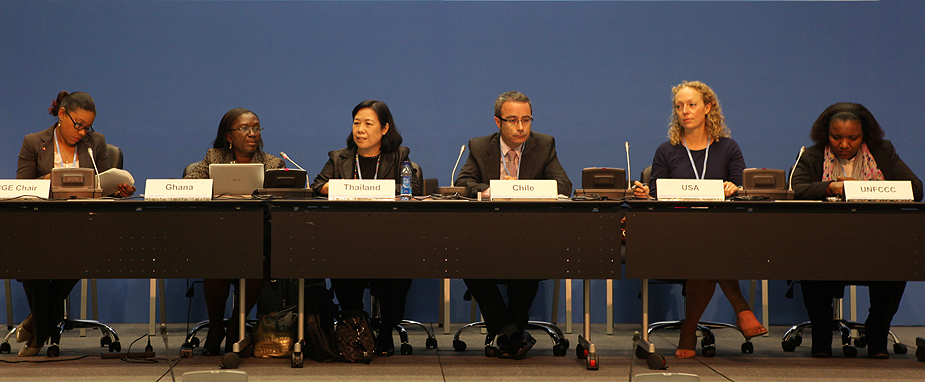 |
Panel (L-R): CGE Chair Ruleta Camacho, Environment Division, Antigua and Barbuda; Patience Damptey, Environmental and Gender Consultant, Ghana; Sangchan Limjirakan, CGE Member, Thailand; Fernando Farías, Ministry of Environment, Chile; Kate Larsen, Department of State, US; and Uazamo Kaura, UNFCCC Secretariat.
|
|
 |
 |
 |
 |
|
 |
 |
 |
 |
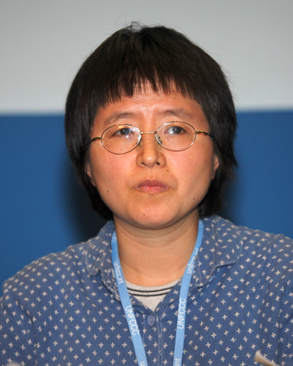 |
| Dale Wen, International Forum on Globalization, said the spin and misinformation spread about China was not conducive to building trust in the negotiations. |
|
 |
 |
 |
 |
|
|
Meena Raman, Third World Network, said the UNFCCC negotiations are at a crucial stage as they move from a “two-track” towards a “single-track” process. She listed a number of unfinished elements from the two-track negotiations that she said should be addressed in Doha, including: a higher level of ambition during the Kyoto Protocol’s second commitment period, determined on a scientific basis; comparable targets for countries that are not party to the Kyoto Protocol; greater clarity on long-term finance for developing countries; and progress on technology-related intellectual property rights.
Dale Wen, International Forum for Globalization, said the spin and misinformation spread about China since the Copenhagen Climate Conference in 2009 is not constructive to building trust. One common myth, she said, is that the US-China impasse is a major roadblock to progress in the negotiations, noting this myth discounts historical emissions and the differences in economic development between the two countries. She said China is doing more than the US to address climate change, emphasizing that China has invested three times more than the US in renewable energy technologies (RETs), relative to gross domestic product. She highlighted that China is being penalized for this, as both the EU and US have filed RET-related anti-dumping cases against China under the World Trade Organization. She called on developed countries to show leadership in action rather than words.
Brandon Wu, ActionAid US, said although the spate of extreme weather events in the US in recent months is bad news, the national debate they have generated on global warming is positive. He said while climate costs are skyrocketing globally, climate finance is in danger of falling off a cliff. He called on developed countries to meet their financial commitments and consider innovative sources.
Kate Dooley, FERN, said the EU has effectively nothing on the table for Doha, noting they are willing to sign on to a 20% cut by 2020 compared to 1990 levels, but have already achieved 18% of that target, and can therefore pursue business as usual for the remaining period. She quoted recent research by the Tyndall Centre for Climate Change Research showing that postponing action to the post-2020 period could prove catastrophic. Unless developed countries listen to the science and increase their ambition, she said, they would be guilty of a crime against humanity.
In the discussion that followed, panelists and participants discussed ways to increase civil society pressure on developed country governments to take action, including through public protests and demonstrations.
|
 |
 |
 |
 |
 e-mail the
Digital Editor
should you have any questions regarding the content of this page
e-mail the
Digital Editor
should you have any questions regarding the content of this page |
 |
 |
 |
 |
The Earth Negotiations Bulletin on the side (ENBOTS) © <enb@iisd.org> is a special publication of the International Institute for Sustainable Development (IISD) in cooperation with the State of Qatar. This issue has been written by Tallash Kantai, Kate Neville, Anna Schulz and Anju Sharma. The Digital Editor is Kate Harris. The Editor is Liz Willetts <liz@iisd.org>. The Director of IISD Reporting Services is Langston James “Kimo” Goree VI <kimo@iisd.org>. Support for the publication of ENBOTS at the Doha Climate Change Conference - November 2012 has been provided by the State of Qatar. The opinions expressed in ENBOTS are those of the authors and do not necessarily reflect the views of IISD and funders. Excerpts from ENBOTS may be used in non-commercial publications only with appropriate academic citation. For permission to use this material in commercial publications, contact the Director of IISD Reporting Services at <kimo@iisd.org>. Electronic versions of issues of ENBOTS from the Doha Climate Change Conference - November 2012 can be found on the Linkages website at http://enb.iisd.org/climate/cop18/enbots/. The ENBOTS Team at the Doha Climate Change Conference - November 2012 can be contacted by e-mail at <anna@iisd.org>.
|
|
|
|
|